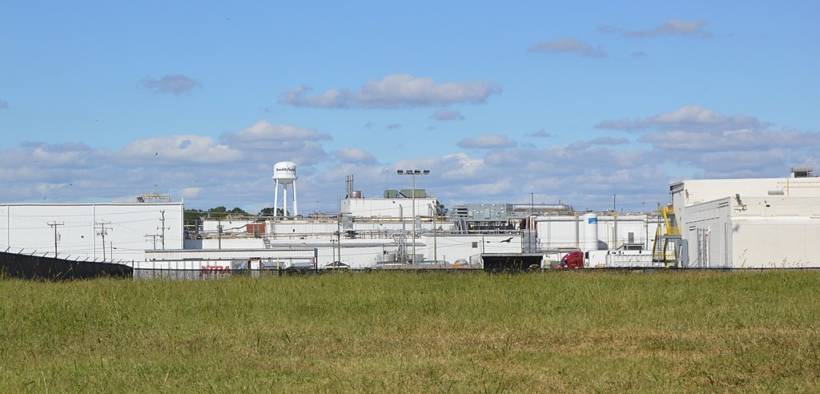Smithfield CEO: US Meat Supply “Perilously Close” To Shortage

“The closure of this facility, combined with a growing list of other protein plants that have shuttered across our industry, is pushing our country perilously close to the edge in terms of our meat supply.”
Smithfield chose to close one of its largest pork-producing plants indefinitely on Sunday after nearly 300 employees tested positive for COVID-19, prompting CEO Kenneth Sullivan to warn that the pandemic is pushing the country “perilously close to the edge” in its meat supply as other food producers throughout the nation grapple with supply chain disruption, waste, and the prospect of potential food shortages among certain perishable items.
“The closure of this facility, combined with a growing list of other protein plants that have shuttered across our industry, is pushing our country perilously close to the edge in terms of our meat supply,” Sullivan said in a statement on Sunday. “It is impossible to keep our grocery stores stocked if our plants are not running. These facility closures will also have severe, perhaps disastrous, repercussions for many in the supply chain, first and foremost our nation’s livestock farmers. These farmers have nowhere to send their animals.”
Sullivan’s move to close the Sioux Falls, South Dakota, plant which provides 4% to 5% of the pork produced in the United States, comes amid pressure from the state’s governor to do more to address the crisis. Other meat producers, such as Cargill, JBS USA, and Tyson Foods, have also cut back or suspended production in response to the pandemic.
Closing pork plants will result in smaller amounts of the meat in grocery stores, notes Krista Foster, professor of supply chain management at the University of Notre Dame’s Mendoza College of Business. “Once the existing inventory is used up, consumers can expect to see smaller quantities of pork products in stores due to processing plant closures,” Foster told NPR.
Historian Erik Loomis pointed to existing occupational safety issues in the meatpacking industry as an underlying reason for the high concentration of coronavirus cases among workers.
Of course, a big part of this is that meatpacking plants are complete disasters that are unsafe for workers in the best of times. The workers are shoved so close together that it is a perfect breeding zone for disease.
— Erik Loomis (@ErikLoomis) April 12, 2020
Beyond meat, producers of other perishable foods have been throttled by the virus’ impact on supply chains. The Wall Street Journal reported last week how farmers and food companies have been forced to cut production amid erased sales to closed restaurants, hotels and cafeterias even as grocery stores demand more supplies. “American producers stuck with vast quantities of food they cannot sell are dumping milk, throwing out chicken-hatching eggs and rendering pork bellies into lard instead of bacon,” reported the Journal.
“Retail cannot absorb it,” farmer Paul Allen explained to the Guardian, having been forced to plow 5 to 6 million pounds of vegetables back into his fields. “Whatever else you’ve got just goes unharvested and you’ve got to mulch it back into the ground. Everybody’s in the same situation.”
The Guardian reports that food banks and other charities lack the capacity to accept donations from the over-supplied farmers, forcing them to waste food.
In a nation whose food needs are at historic highs, our Wall Street centered systems only allow for the massive dumping of farm fresh food
Massive as in millions of pounds, smashing of 750,000 eggs, and dumping 3.7 million gallons of milk – a day https://t.co/eVRpduAZIa
— rafael (@rafaelshimunov) April 13, 2020
Marion Nestle, a professor of public health and nutrition at New York University, told the Huffington Post that while there is not a shortage yet, the pandemic is exacerbating existing failures in the food system that bring dangerous consequences:
“That the food system is failing is a given: Witness hunger and food insecurity, Type 2 diabetes and heart disease, the impact of industrial agriculture on the environment, and gross inequalities among people involved in food production and consumption.
Coronavirus reveals these usually invisible inequalities.
What I hope will come out of this [crisis] is a system that pays farmworkers, packinghouse workers and restaurant workers more fairly. There is already a lot of worker unrest as the burden of food system work has fallen on the people who are paid the least.”
Nestle explains that every aspect of the food supply chain is impacted by the pandemic, from production to transportation and distribution, and that the system will have to be reconfigured to ensure people without resources don’t starve: “the number one problem in America when it comes to food is having enough for the people who do not have the resources to get it.”
Other experts warn that without adaptation to the new challenges presented by the pandemic, food shortages among perishable items could become a reality.
But this question about food supplies is actually a very real one. Not on everything–but in terms of meat, dairy, fruits and veggies–anything that requires a lot of people–significant shortages are possible pretty soon.
— Erik Loomis (@ErikLoomis) April 12, 2020
















Smithfield was bought by China in 2013. Makes me wonder that maybe the 300 employees got this from someone who is flying back and forth from China to America… China has a different standard to clean than we do in America. I stopped buying Smithfield in 2013.